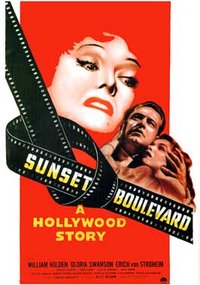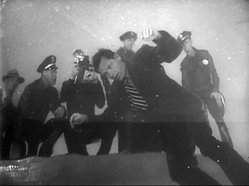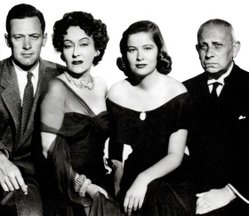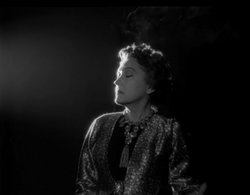Sunset Boulevard
Sunset Boulevard (also known as Sunset Blvd.) is a 1950 American film noir containing elements of drama, horror, and black comedy. Directed and cowritten by Billy Wilder, it was named for the famous boulevard that runs through Los Angeles and Beverly Hills. more...
It stars William Holden as down-on-his-luck screenwriter Joe Gillis, and Gloria Swanson as Norma Desmond, a faded movie star who entraps the unsuspecting Gillis into her fantasy world in which she dreams of making a triumphant return to the screen. Erich von Stroheim, Nancy Olson, Fred Clark, Lloyd Gough and Jack Webb play supporting roles. Director Cecil B. DeMille and gossip columnist Hedda Hopper play themselves, and the film includes cameo appearances by leading silent film figures Buster Keaton, H. B. Warner and Anna Q. Nilsson.
Praised by many critics when first released, Sunset Boulevard was nominated for eleven Academy Awards and won three. It is widely accepted as a classic, often cited as one of the most noteworthy films of American cinema. Deemed "culturally significant" by the U.S. Library of Congress in 1989, Sunset Boulevard was included in the first group of films selected for preservation in the National Film Registry. In 1998 it was ranked number twelve on the American Film Institute's list of the 100 best American films of the 20th century.
Plot
The opening scene reveals that a man has been killed, and his corpse is seen floating face down in a swimming pool. The dead man (who narrates the rest of the movie) explains he was Joe Gillis, an unsuccessful film writer. The film fades into flashback as he describes his attempt to flee by auto from two repossession agents. He turns into a driveway on Sunset Boulevard in order to escape them, and sees what he assumes to be a deserted mansion. He enters the house, where he meets a German butler and an eccentric older woman who mistakes him for an undertaker, visiting to arrange the funeral for her recently deceased pet chimpanzee. Gillis recognizes her as Norma Desmond, formerly one of the great stars of the silent screen. She offers him a job reading the script she has been writing for her planned comeback, and seizing a rare chance to make some money, he agrees.
Soon he is completely financially dependent upon Norma, who lavishes attention on him and buys him expensive clothing; while he occasionally shows discomfort, he makes no effort to change his situation. He is horrified when Norma reveals on New Year's Eve that she is in love with him. Rejecting her attempt at seduction, he drives to a friend's house where a party is underway and speaks with a young woman named Betty who is interested in his writing. Inspired to continue his writing, he phones the Desmond house to say he is leaving, but is told Norma has attempted suicide. He rushes back to the mansion, where he comforts her and stays. The two seem relatively content as Norma continues working on her script. When she considers it to be complete, she sends it to Paramount Studios. She receives telephone calls from Cecil B. DeMille's office at the studio and assumes he is interested in filming the project. She travels to the studio and meets with him; Gillis and the butler learn the studio only wants to hire Norma's vintage Isotta-Fraschini car for use in a film and has no interest in her script, but the two of them keep this from her. Joe begins secretly meeting with Betty to work on a screenplay and they fall in love. When Norma discovers this, she phones Betty and insinuates what sort of man Joe really is. Joe returns to the house in time to hear what Norma has said and takes the phone from her. He tells Betty to come to the house, where he explains his side of the situation before turning Betty away. Misunderstanding his actions, Norma is grateful to Joe, but he brushes her aside and begins packing to leave. Norma threatens to shoot him, but he does not take her seriously. As he walks away, she follows and shoots him several times before he falls dead into the pool.
Having explained how Joe Gillis met his death, the film returns to the present, where Norma Desmond appears to be lost in fantasy. News cameras arrive to film her, and she thinks she is on the set of her new film. Norma slowly descends her grand staircase and, after making a speech declaring her happiness at making a new film, she reaches for the camera, the screen fades to white and the narrator concludes that Norma's dream of performing for the cameras has in an unexpected way come true for her.
Read more at Wikipedia.org




